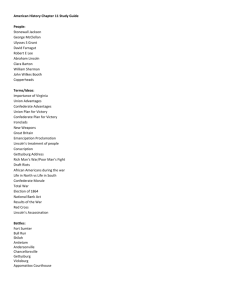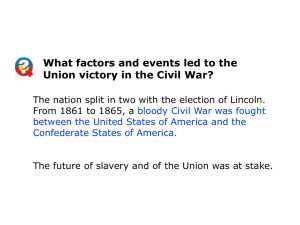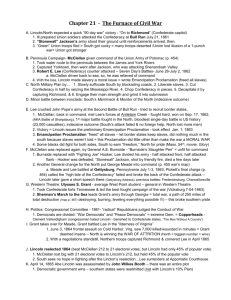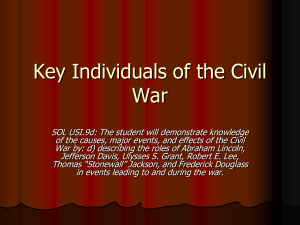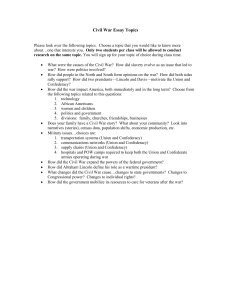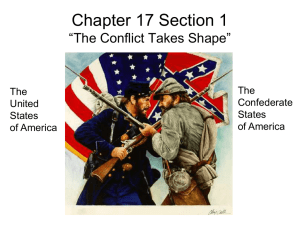Objective 3.03 - mageeakhistory
advertisement
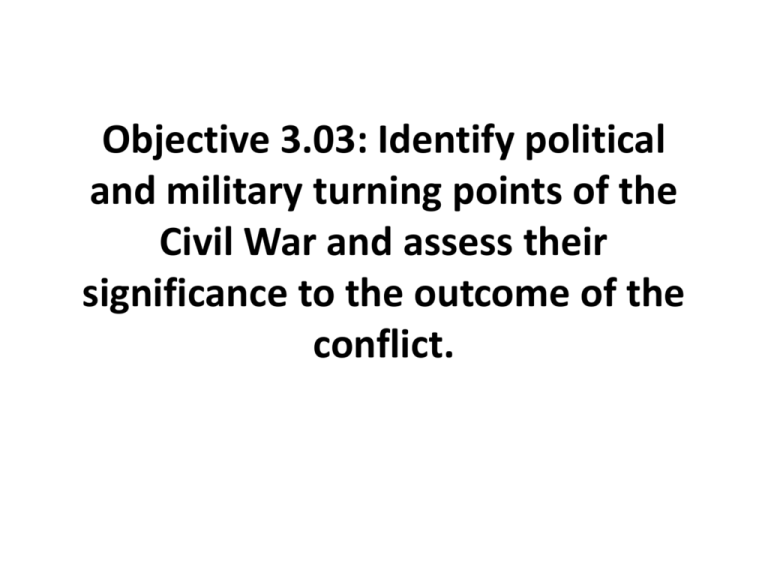
Objective 3.03: Identify political and military turning points of the Civil War and assess their significance to the outcome of the conflict. THE ASSETS OF EACH SIDE NORTH • • • • • • 71 percent of US population (31 million) South was 40 percent slave 86% US industrial capacity 71% railroad mileage Most ships in US Navy Superior civilian leadership SOUTH • • • • • • Defensive position Interior lines Accurate rifles as 400 yards Union victories hard to follow up Plentiful military leadership and talent: Lee, Jackson, Stuart Able to create industrial capacity for arms THE ATTACK ON FORT SUMTER, APRIL 12, 1861 Overview of the North’s Civil War Strategy: “Anaconda” Plan Union strategy 1. Blockade Southern ports 2. Split the Confederacy in half at Mississippi R. 3. Capture Confederate capital (Richmond, Va.) Southern Strategy 1. Stay on Defensive 2. Invade North when opportunity arises The Leaders of the Confederacy - His poor relations with some Confederate leaders made it difficult for him to uniting Confederacy Pres. Jefferson Davis The Confederate Generals “Stonewall” Jackson George Pickett Robert E. Lee Lincoln’s Generals William Tecumseh Sherman George McClellan Ulysses S. Grant Battles 1st Battle of Bull Run/1st MANASSAS: IMAGES OF MILITARY GLORY A quick and Glorious War? 1st MANASSAS: BATTLEFIELD REALITIES 1st Battle of Bull Run/1st MANASSAS (July, 1861) • • • • First bloodshed of War Union forces routed Shows war will be no picnic. Lincoln calls for the 50,000 to serve 3 years rather than 3 months. Calls for another 500,000 troops. Fighting in West • Grant Makes name for self in West. • Captures important Forts on rivers. • Battle of Shiloh – Tenn. March 1862 Grant surprised but recovers the next day, 25,000 troops killed, wounded, or captured from both sides. • Result: ends Southern hope of blocking the Union advance into Mississippi. George McClellan • McClellan - very slow, cautious, finally heads toward Richmond in Spring of 1862 • Outmaneuvered by Lee in Seven Days Battles. • Lee goes on offensive toward Union Capital in D.C. • Battle of Antietam, Maryland Sept, 1862 – bloodiest single day in American History • – 26,000 casualties – more than Mexican, war of 1812 COMBINED! • Significance: Union troops turned back a Confederate invasion of Maryland. Lincoln issues Emancipation Proclamation. • McClellan . Emancipation Proclamation 1863 • “my paramount object in this struggle is to save the Union and is not to either save or destroy slavery” – Lincoln, 1862 • Emancipation Proclamation – freed slaves only in those states in rebellion. Did not apply to Southern territory already in Union hands. • So what?: Helped discourage Britain from intervening on the side of the South and gave war a higher purpose. • Now clear slavery will not go on if South loses. • Many African-Americans enlistment with Union army. Turning Point of War: Battle of Gettysburg, Pennsylvania July 1-3, Vicksburg July 4th • Lee defeats Union army at Chancellorsville, Va. • Stonewall Jackson shot by own men 1863. • Lee hoped an invasion North would turn political tide toward peace. • Turning point in battle Picket’s charge up missionary ridge. • Huge Casualties on both sides! • Union loses 23,000 • Confederacy 28,000 • Vicksburg falls July 4, 1863 – city under siege from May, Confederacy now cut in two at Mississippi R. Ending the War • • • • • • • • • • Lincoln issues Gettysburg address, Nov. 1863 Confederate morale wears down (inflation, shortages, desertion) March 1864 – Grant attempts to pin down Lee. May 4 - June 18: Grant loses 60,000 men to Lee’s 32,000. Sherman’s Captures and burns Atlanta Sept 2. Marches to Seadestroys crops, burns towns and private homes… followed by 25,000 slaves… total war. Fair? Oct 19 – Union victory in Shenandoah Valley in Northern Virginia. Election of 1864 : Lincoln vs. McClellan; Union Victories in Atlanta and Shenandoah help Lincoln win. March 1865 – Lee surrenders at Appomattox Court House--- Grant generous terms lets soldiers go home on paroled, officer’s keep side arms, gave them 3 days rations… After a long siege, Grant captured Petersburg and Richmond in April 1865 Lincoln shot by John Wilkes Booth Good Friday, April 14, 1865 Four score and seven years ago our fathers brought forth on this continent, a new nation, conceived in Liberty, and dedicated to the proposition that all men are created equal. Now we are engaged in a great civil war, testing whether that nation, or any nation so conceived and so dedicated, can long endure… It is rather for us to be here dedicated to the great task remaining before us—that from these honored dead we take increased devotion to that cause for which they gave the last full measure of devotion—that we here highly resolve that these dead shall not have died in vain—that this nation, under God, shall have a new birth of freedom— and that government of the people, by the people, for the people, shall not perish from the earth. Legacy of War • • • • • • • • • • • • Lincoln uses extraordinary Executive Power under banner of War Powers – In order to keep these states in the Union, Lincoln suspended the Writ of Habeas Corpus (rule requiring authorities to bring jailed persons before the court and state why they are begin jailed), jailing more than 13,000 suspected Confederate sympathizers without trial. He also seized telegraph offices to insure they were not used for anti-union activity. Lincoln also jailed Northern Democrats, known as Copperheads, who advocated peace with the South. Lincoln ignored Supreme Court Chief Justice Roger Taney’s deliration that Lincoln had gone beyond his constitutional powers. Conscription – draft forcing certain individual to serve in the army. Both North and South instituted Drafts. South first in 1862, North in 1863. Both Drafts allowed exemptions for rich – in South substitutes could be hired and planters with more than 20 slaves. In North, allowed hiring of substitutes and paying $300 to avoid conscription outright. 92% of Union Army were volunteers, 180,000 African American Draft riots 90% of eligible Southern men served in war. NY City Draft Riots – July 13-16th 1863– killed 100 people - mostly poor angry whit workers, esp. Irish, worried Southern blacks would come to North and take their jobs, did not want to have to fight for slaves. Damaged Rep. Newspaper offices, anti-slavery homes, attacked African Americans, well dressed men in streets. A revolution in Warfare: Ironclad ships (Monitor vs. Merrimack) Rifles, more accurate, quicker to reload, Minie ball more devastating, Defense has huge advantage. Fortifications huge, ditches, etc. Civil Liberties under attack? Lincoln suspends writ of habeas corpus • More than 13,000 suspected Confederate sympathizers jailed without trial. • Lincoln also jailed Northern Democrats, known as Copperheads, who advocated peace with the South. Patriot Act 2001 • • • • Opponents of the law have criticized its: authorization of indefinite detentions of immigrants; searches through which law enforcement officers search a home or business without the owner’s or the occupant’s permission or knowledge; the expanded use of National Security Letters, which allows the Federal Bureau of Investigation (FBI) to search telephone, e-mail, and financial records without a court order, and the expanded access of law enforcement agencies to business records, including library and financial records. Getting around the law • • June 12, 2008, the U.S. Supreme Court, in the case of Boumediene v. Bush, ruled that the denial of habeas corpus rights to Guantanamo detainees was unconstitutional and that all Guantanamo detainees have the right to a full hearing in which they can contest the accusations against them. In the wake of the Boumediene ruling, the U.S. Government wanted to preserve the power to abduct people from around the world and bring them to American prisons without having to provide them any due process. So, instead of bringing them to our Guantanamo prison camp (where, the U.S. Supreme Court ruled, they were entitled to habeas hearings), the Bush administration would instead simply send them to our prison camp in Bagram, Afghanistan, and then argue that because they were flown to Bagram rather than Guantanamo, they had no rights of any kind and Boudemiene didn't apply to them. The Bush DOJ treated the Boumediene ruling, grounded in our most basic constitutional guarantees, as though it was some sort of a silly game -- fly your abducted prisoners to Guantanamo and they have constitutional rights, but fly them instead to Bagram and you can disappear them forever with no judicial process. Put another way, you just close Guantanamo, move it to Afghanistan, and -- presto -- all constitutional obligations disappear. Homework 9/26
